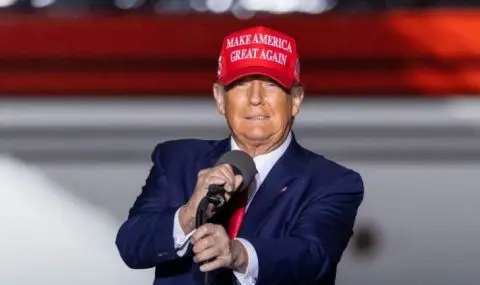Italian Prime Minister Giorgia Meloni will test his skills as a mediator between the EU and the US during his meeting with US President Donald Trump at the White House today - the first European leader to meet face to face with Trump since he announced and then froze 20% tariffs on exports from Europe.
Meloni secured the meeting at a crucial moment in the trade war as the leader of Italy, but Meloni has to some extent been "delegated" and the informal role of representing the European Union. Throughout her trip, she was in close contact with European Commission President Ursula von der Leyen and “the work (with her) is closely coordinated,” a Commission spokeswoman said this week.
“We know we are in a difficult moment,” Meloni said this week in Rome. “I am certainly aware of who I represent and what I am defending,” she added.
The European Union defends, as Brussels puts it, the world’s most important trading relationship, with annual trade worth 1.6 trillion euros.
The trade negotiations fall under the remit of the European Commission, which has been pushing for zero tariffs with the United States. However, Trump administration officials in talks with the EU have yet to publicly show any sign of abandoning the 10% base tariff on all foreign imports that the Republican president is pushing for. He has paused for 90 days the retaliatory increase in tariffs to 20%.
The delay has raised some hopes for negotiations, and Meloni's chances of progress lie more in getting clarity on Trump's goals than in getting direct concessions, experts say.
"This is a very delicate mission", said Fabian Zuleg, chief economist at the Center for European Policy, a Brussels think tank. "The whole trade agenda is there, and although she is not conducting formal negotiations, we know that Trump likes this kind of informal dialogue, which in a sense is negotiations. So she has a tough task," he added.
As the leader of a far-right party, Meloni is ideologically close to Trump on issues such as limiting migration, promoting traditional values and skepticism about multilateral institutions. But there have also been some differences over Meloni's staunch support for Ukraine.
The Italian prime minister was the only European leader to attend Trump's inauguration on January 20, but she has since been reserved about the Republican's policies that have shaken the transatlantic alliance. Meloni has condemned the tariffs as "wrong" and, after a heated exchange at the White House between Trump and the Ukrainian president, warned that "a division in the West would be disastrous for everyone."
"She was very careful," said Wolfgang Piccoli, an analyst at London-based consultancy Teneo. "That's exactly what we need when we have a partner who changes every day," he added.
Italy has a trade surplus of 40 billion euros with the United States, the largest of any country, fueled by Americans' appetite for Italian sparkling wine, foods such as Parmigiano Reggiano and Parma ham, and Italian luxury fashion.
These are all sectors that are crucial to the Italian economy and are supported mainly by small and medium-sized producers, who are the main center-right voters.
"Above all, I think she will focus on the very strong economic and trade relations that Italy has with the United States, not only in terms of exports, but also in the services and energy sectors," said Antonio Villafranca – vice president of the think tank ISPI in Milan. "For example, Italy could even consider importing more gas from the United States," he added.
The Washington meeting also comes amid growing concerns about global uncertainty, fueled by escalating tariff wars. Italy's economic growth forecast for this year has been cut from 1% to 0.5%.
Meloni is also expected to respond to Trump's demand that NATO countries increase their defense spending to 2% of GDP. Italy's spending, at 1.49% of GDP, is among the lowest in Europe.
However, experts have warned against getting too high expectations for concrete progress.
"The best strategy was to be very cautious – to get to the meeting, to assess the options", Piccoli said. "If, upon her return, she can provide an idea of how Washington wants to shape its future relations in the areas of trade, defense and policy towards Ukraine, that would be a huge victory," he added.
(BTA)
(Translated from English: Valeria Dinkova)
